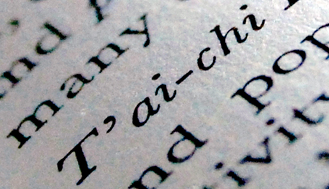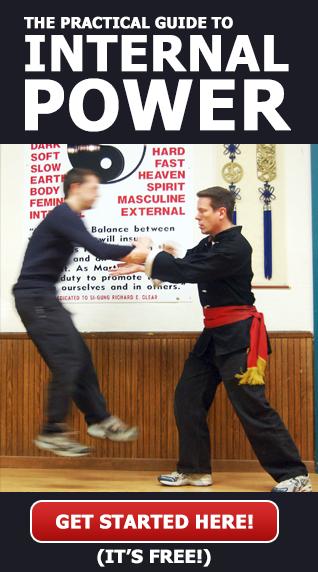
The Tai Chi Glossary contains definitions of many Tai Chi terms and phrases. As well as links to more information of many of the topics. Please use the comments section to post any internal martial arts or Chi Kung terms and phrases that you would like to see added to this Tai Chi Glossary, and we will add them as quickly as possible.
Chi, qi – Energy. Often referring to energy inside the body. Also means breath.
Chi Kung, qigong – Energy work. A system or method of working with the bodies energy. There are many different kinds of chi kung and many different schools of thought. Tai Chi is one type of Chi Kung.
Chin Na – Seize and hold. Refers to Chinese grappling techniques.
Dan Tian – Energy Center. There are three Dan Tian’s in the human body.
Dim Mak – Death Touch. This refers to a knowledge of the bodies vulnerable areas and how to strike them.
Empty Force (kong jing) – This is the ability to use energy to effect someone without touching them. This jing is very rare, in fact many people believe it to be a myth.
Fa jing (explosive energy) – This jing is the ability to move or discharge power explosively.
Jing – An expression of energy. Chi is energy, Jing is what you do with that energy.
Kung Fu (gong fu) – Work Skill. A high level of skill developed through long hard practice.
Marrow Washing – A Chi Kung method that rejuvenates the bone marrow.
Meridian – Energy pathway in the body. Similar to the way blood flows through blood vessels, energy in the body flows through the meridians.
Nei Kung (Nei Gong) – Internal Work
Peng Jing – This jing is described as having the body/energetic quality of a raft floating on water.
Push Hands – A drill or game in Tai Chi that allows students to practice their tai chi skills, energetics and movement against an opponent. There are many variations of push hands.
Shen – Emotional mind intent. You use your mind or intent to use the energy stored in your body (chi.) How you use that energy is a jing (jin.) So if you act out of emotion this is shen.
Sung – A relaxed body/mental state. This is different from collapsed or flimsy.
Tai Chi, Taiji, Taijiquan, Tai Chi Chuan – Grand Ultimate Fist. A form of internal kung Fu.
Wu Chi, Wuji – This is a posture in Tai Chi. It often describes emptiness or a state where yin and yang cannot be distinguished from one another.
Wu Shu – Chinese Martial Arts, This is usually used to refer to the more acrobatic sport versions of Chinese Martial Arts.
Yang – Male, fast, aggressive, hard, light, hot, etc… The opposite/complement of Yin.
Yi – Intellectual mind intent. Acting with forethought and planning would be a usage of Yi.
Yin – Female, slow, yielding, soft, dark, cold, etc… The opposite/complement of Yang.

Although perhaps not worth adding to the glossary (as this just complicates things), one might occasionally run across a reference to dao yin. The term “qi gong” is relatively modern, tracing back to probably the early 1900s.
For several hundred years before that (going back to at least the 2nd century BC, actually), the more common term was “dao yin” (or “tao yin” in the outdated Wade-Giles Romanization), which means to something along the lines of “guide & pull”. Much as tai chi chaun may be considered moving & expressing form of qi gong, dao yin had an active & forceful aspect, too. This was often referred to as daoqi yinti (or taochi yinti) and means something like “guiding qi by stretching the body”.
The healing properties of qi have been known for more than two millennium as well and, before modern times, might have been referred to as daoqi yinliao. Yinliao translates to something close to “drink”, suggesting the idea of qi as a health-providing elixir.
Personally, I like that mental imagery…